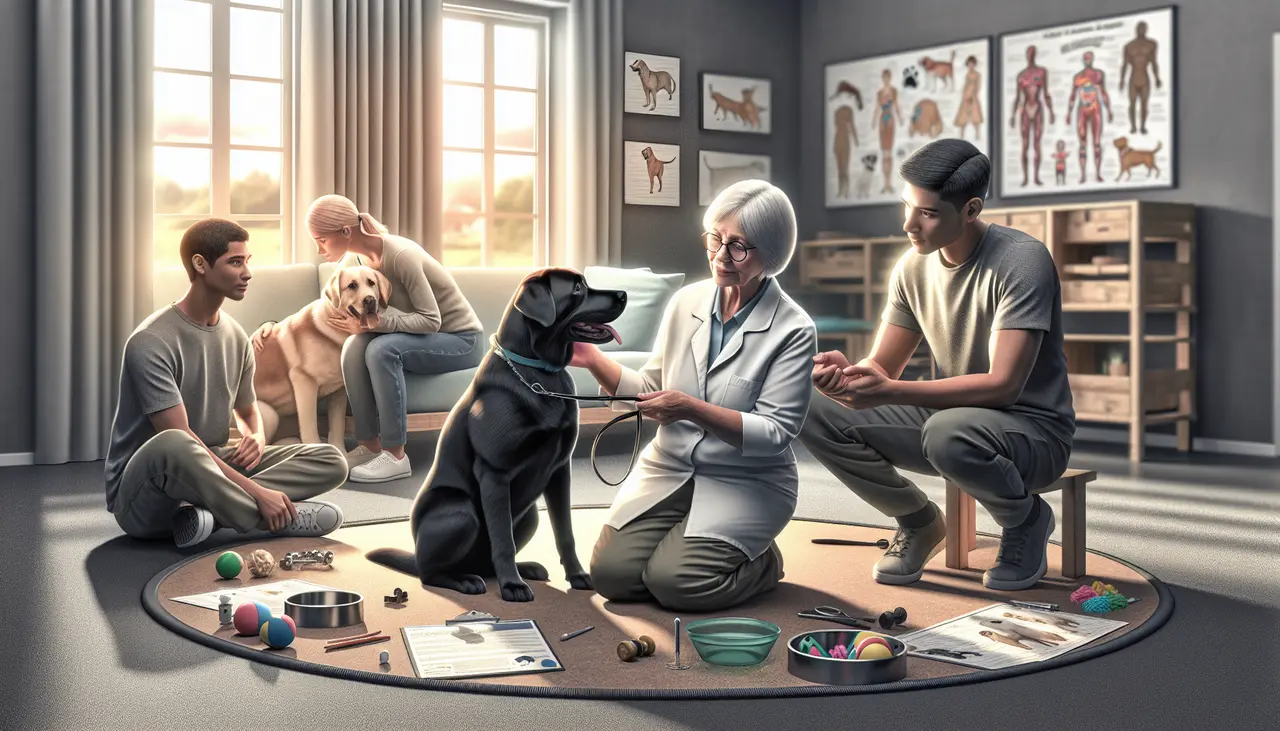Introduction to Dog Behavioral Issues
Dogs can show a variety of behavioral issues, from barking non-stop to chewing on everything in sight. Understanding these problems is the first step to solving them. Most times, these behaviors are a dog’s way of telling us they’re bored, stressed, or not getting enough exercise. Some common issues include excessive barking, chewing, digging, and aggression. Each of these behaviors can be addressed and corrected with the right approach and patience. Remember, every dog is different, and what works for one might not work for another. It’s about finding what motivates your dog and using that to guide their behavior in a positive direction.
The Importance of Dog Behavior Consultation
Getting your dog to behave might seem tough at first. You try to teach them, but sometimes things just don’t click. This is where a dog behavior consultant comes in handy. Think of them as a teacher for your dog, but they’ve got tricks up their sleeve you might not even know about.
A dog behavior consultant specializes in understanding why dogs do what they do. They look at things from your dog’s point of view. If your furry friend is barking all night, chewing on your shoes, or being a bit too protective, a consultant can figure out the why and show you how to fix it.
It’s not just about solving problems though. Consulting with an expert can prevent issues before they start. By understanding what’s normal and what’s not in dog behavior, you can create a stronger bond with your pet. This means less frustration for you and a happier life for your dog.
Some might think, why pay for a consultant when the internet is full of free advice? Well, every dog is different. What works for one might not work for another. A consultant gives personalized advice that’s tailored to your dog’s needs, and sometimes, that makes all the difference.
So, don’t wait for small issues to become big problems. Consulting a dog behavior expert can save you time, money, and stress in the long run. Plus, it’s pretty cool to see your dog learn and grow into their best self.
Identifying Common Dog Behavioral Problems
Understanding your dog starts with noticing their habits. Are they barking non-stop, chewing on your shoes, or ignoring your calls? These are signs of common behavioral issues. Barking, for instance, is normal but excessive barking hints at boredom or anxiety. Chewing is part of how dogs explore, but when your favorite sneakers become the target, it means they lack proper toys or are stressed. Ignoring commands? This might be a sign they need more training or aren’t understanding you. Recognizing these patterns early is key to helping your furry friend live a happy, balanced life.
The Role of a Dog Behaviorist in Your Pet’s Life
A dog behaviorist plays a crucial role when it comes to sorting out your dog’s behavioral issues. Think of them as a skilled coach who understands what makes your furry friend tick. They dig deep into the why and how of behaviors like excessive barking, aggression, or separation anxiety. By using their knowledge, they craft personalized plans to turn those problem behaviors around. It’s not just about training your dog to sit or stay. It’s about understanding their emotional needs and guiding them towards being well-adjusted pets. So, if your dog’s behaviors have left you baffled, a visit to a dog behaviorist might just be the game changer you need.
How Expert Consultation Can Help Modify Dog Behavior
Experts can pinpoint the root of your dog’s bad behavior. They see things you might miss and understand why your dog does what it does. Whether it’s anxiety, aggression, or not following commands, these pros have the strategies and techniques you need. They offer tailored solutions. No two dogs are the same, and what works for one may not work for another. With expert guidance, you get a customized plan that suits your dog’s personality and needs. Consistency is key, and these experts will show you how to apply their methods daily, ensuring lasting behavior change. Plus, they provide support and motivation, keeping you on track. With their help, you and your furry friend will see real, positive change.
Key Strategies Used in Dog Behavior Modification
Experts use several key strategies for fixing dog behavior problems. First, positive reinforcement stands out. This means rewarding good behavior with treats or praise to encourage more of it. Instead of yelling or punishing for bad behavior, this approach focuses on the good stuff. Then, there’s consistency. Dogs thrive on routine. So, if jumping on the couch is a no-go, it’s always a no-go. Changing rules confuses them. Ignoring bad behavior sometimes works too. Attention, even when you’re mad, can make certain behaviors stick. So, ignoring things like whining or barking for attention can eventually stop them. Exercise is huge. A tired dog is a happy and less destructive dog. Regular walks, playtime, and mental challenges keep them from acting out. Lastly, experts might suggest professional training or behavior modification classes for tough cases. Getting professional help can make a massive difference, tailoring solutions to your dog’s needs.
Real-Life Success Stories: Before and After Behavior Consultation
People often wonder if investing in a behavior consultation for their dogs is worth it. Here’s your proof. Let’s talk real-life success stories. Jake, a hyperactive Labrador, used to turn the house upside down. His owners tried everything from online tips to dog training books, but nothing worked. After a detailed behavior consultation, they learned specific techniques tailored just for Jake. Three months down the line, Jake is more relaxed, follows commands, and the chaos is history. Then there’s Misty, a skittish rescue who wouldn’t let anyone near her. Her consultation revealed deep-seated fears from her past. With patience and the right approach, Misty began to trust. Now she’s a cuddle bug with her own Instagram fanbase. It boils down to understanding your dog and addressing issues with expert advice. Behavior consultations aren’t just talks; they’re game-changers for you and your dog.
Preparing for Your Dog’s Behavior Consultation Session
Before you and your furry friend head to a dog behavior consultation, there are a few things you should do to make the most out of the session. Firstly, jot down specific behaviors you’ve noticed and want to address. This could be anything from excessive barking to showing aggression towards other dogs. Having a clear list helps the expert understand your concerns better. Also, try to recall when these behaviors started and what might have triggered them. This information can be crucial for the consultant to tailor a solution for your dog.
Secondly, gather any medical records or history for your dog that you have on hand. Sometimes, behavior issues are linked to health problems, so having this information can be very helpful.
Lastly, be open and honest with the behavior consultant. They’re here to help, not judge. The more they know about your dog’s history, environment, and your own handling of the dog, the better they can assist. Remember, it’s a team effort to ensure your dog leads a happy and well-behaved life.
What to Expect During and After the Consultation
During the consultation, expect the expert to observe your dog, ask you questions about its history, behavior, and environment. They might want to see how your dog behaves on its own and with others, including with you. Prepare to discuss your dog’s daily routine, any specific incidents of concern, and what goals you have. The expert will likely offer insights and strategies tailored to your dog’s needs, which could include training exercises, changes in routine, or even dietary adjustments.
After the consultation, you should have a clear action plan. This plan will outline steps to address the behavioral issues discussed. You might receive training resources or be asked to make modifications in your home or your approach to handling your dog. Follow-up sessions might be scheduled to monitor progress. Improvement in your dog’s behavior won’t happen overnight. It requires consistency and patience from you, guided by the expert’s advice. Remember, the goal is to make life happier and safer for both you and your dog.
Summary and Final Thoughts on Improving Dog Behavior Through Expert Help
Seeking expert help for dog behavioral issues is a game-changer. Whether it’s excessive barking, chewing, or aggression, professional trainers have the know-how to address these problems effectively. They don’t just treat the symptoms; they dive deep to understand the root cause of your dog’s behavior. Remember, the key is consistency and patience. Changes won’t happen overnight, but with expert guidance, you can see remarkable improvement. Your dog can become the well-behaved companion you’ve always wanted. This journey might require an investment of time and sometimes money, but the peace of mind and strengthened bond with your furry friend are well worth it.



Leave A Comment